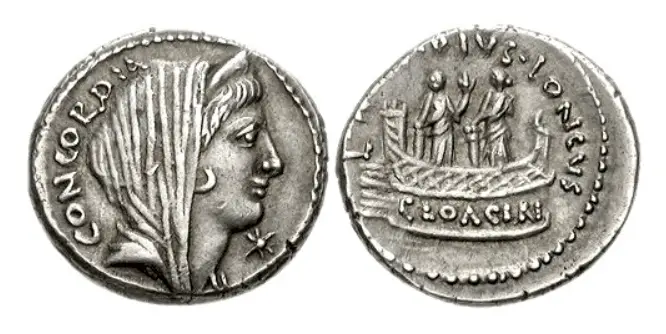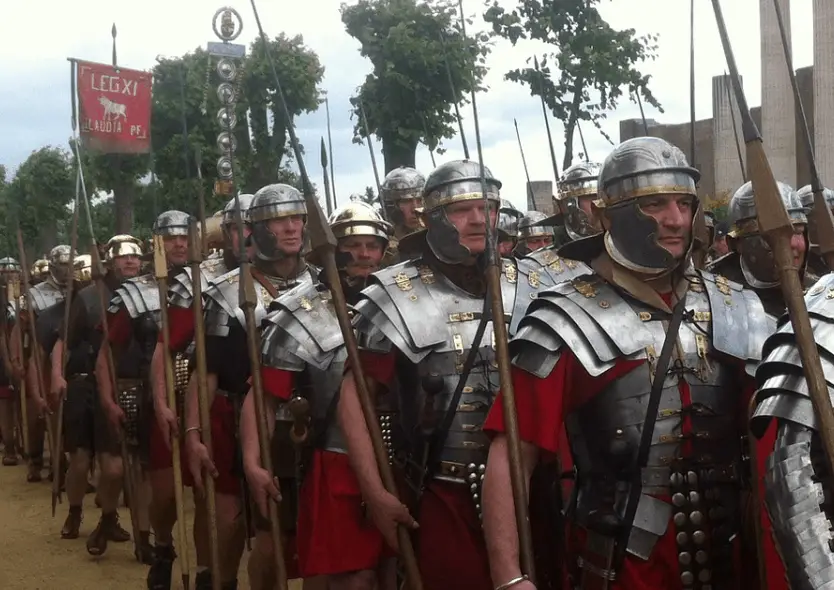The Roman empire was one of the largest empires ever, and in this list, You’ll find some fun facts about the Romans You probably don’t know yet.
In its glory days, the Roman Empire ruled most parts of Europe, Western Asia, and Northern Africa.
The Roman army was one of the most sophisticated warrior groups in history, allowing the Romans to defend their borders for well over 1,000 years.
The culture back then can’t be compared with the culture we know today.
That’s why we did some digging to discover some fun facts about the Romans that were very usual during this period in humanity, but quite peculiar today.
1. Purple and red were a sign of wealth
If you saw a Roman strolling by wearing purple or red clothes, you could be assured that he or she was a rich man or woman.
To make purple or red clothes, the cloth needed to be dyed with very expensive stuff imported from far away, so only the people with money could afford those.
The colors that indicated the rich status of the Roman were purple, red and green. Colors showing signs of poverty were yellow, brown, grey and black.

2. A unibrow was considered intelligent
What do we think of unibrows today? In most countries it’s probably not considered to be a thing of beauty, hence many people wax their eyebrows away.
Obviously, that’s just a superstition or cultural influence from current times. Back in the days of the Roman empire, having a unibrow was seen as a sign of intelligence.
Roman women even tried to make their eyebrows look thicker as it wasn’t just a sign of intelligence. Thye went so far as to add additional hair. Kind of like a wig for eyebrows.

3. Phallic symbols for good luck
We already talked about some weird traditions around the world which included some remarkable lucky charms.
The Romans would easily top the list, as they not only wore phallic symbols as jewelry or simply in their pocket for good luck, they would also place phallic symbols over their door.
To make this fun fact about the Romans even funnier, the phallic symbols were sometimes winged as well.
Behold, the embodiment of the divine phallus, the perfect lucky charm to accompany your car keys:
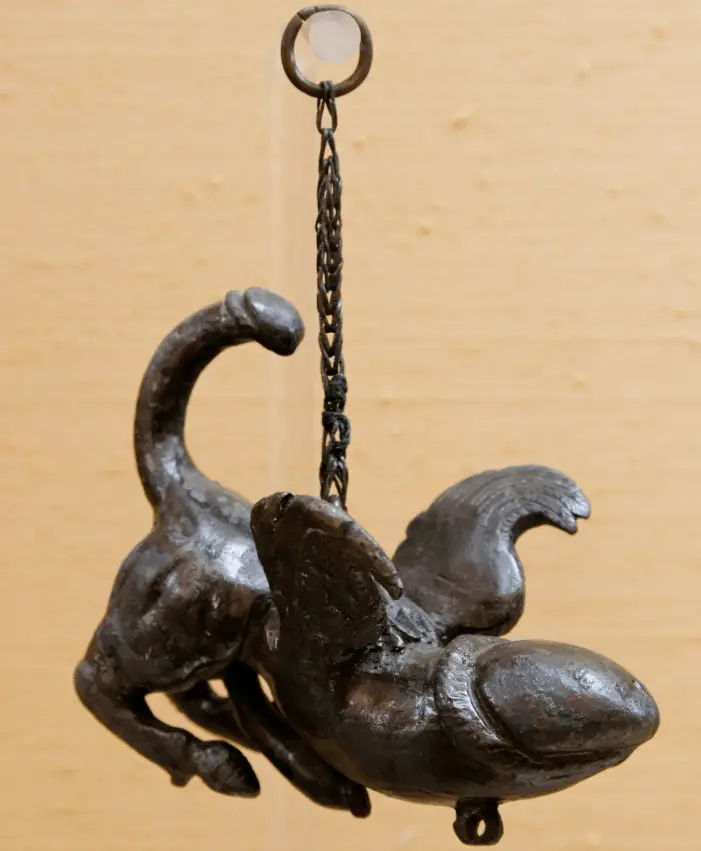
4. Making good use of urine
Alright, this will surely gross out a few of you, but it actually happened in ancient Rome. They used human urine for several things, including:
- Whitening their teeth – Believe it or not, but urine was used by Romans for their daily morning teeth scrub. The smell of their breath must have have been wonderful don’t you think?
- Juicing up their fruit – Urine contains nitrogen and phosphorous and was used by the Romans to help grow juicy fruit. This seemed to work especially well with pomegranates.
- Heal sick animals – It was believed that urine had the power to cure sick animals. Animals that got the flu were forced to drink human urine. Whether or not it worked is unclear.
- Washing clothes – the Roman version of the washing machine looked quite a bit different than the ones we use today. In the fullery, the Fullo (person working in the fullery) put urine in a big stone vat, went inside bare-foot and started jumping up and down until the clothes were all done.
Urine, what is it good for? 🙂
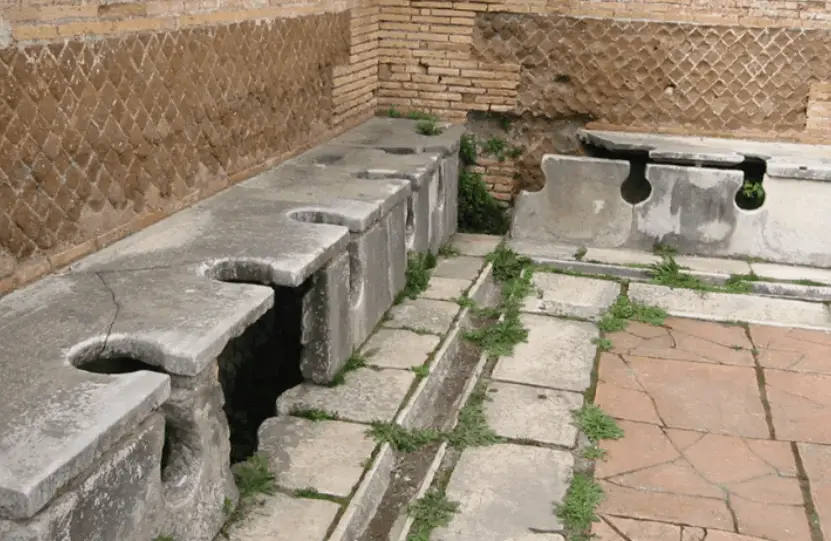
5. Toilet paper didn’t exist yet
Ancient Rome has been praised for its advanced technology. Sewage is something that was never seen before anywhere in the world.
One would assume that the levels of hygiene were up to this level as well.
Not quite.
Instead of using toilet paper to clean themselves in public latrines like the one you see above, they simply used a wet sponge.
Finished? Pass it on to the left side!
It’s not surprising then that recent studies have shown that whipworm, ringworm, and the parasite that causes dysentery were quite common in ancient Rome.
Pretty gross isn’t it?
6. The world’s first shopping mall
While it didn’t exactly look like the modern structures we see today, the Romans were well ahead of their time as they built the first shopping mall.
At least something that resembles a shopping mall.
The outlet is called Trajan’s market, named after Emperor Trajan, and is located just across the Roman Colosseum.
While there are many shops, it is believed to have been a multi-functional building as it also contained offices and a library.

7. Let’s have an epic boat battle!
One of the more tragic things during the Roman empire was the sort of entertainment they liked.
Gladiators were put in an arena with wild, hungry animals and given deadly weapons to fight each other to the death.
Most of the time, the Romans tried to recreate battles of their victories abroad. Kind of like a play in which the losers get killed.
As the Romans often fought overseas, a lot of battles happened in the water. So what did they do?
They simply flooded the Colosseum with water!
Luckily, today we can simply recreate these on the big screen so nobody actually has to die for the sake of entertainment.

8. Togas were worn by high ranking people and…
…Prostitutes!
Clothing was very important to ancient Romans. It expressed your position and how important you were.
Therefore, if you ranked very high on the imperial ladder, you wore a toga.
Strangely enough, the clothes worn by the people on top of the ladder such as high-ranking senators and the emperor himself were the same clothes worn by prostitutes.
Obviously, prostitutes weren’t ranking very high, and they only wore them because they weren’t allowed to wear the traditional garment of Roman women, called the stola.
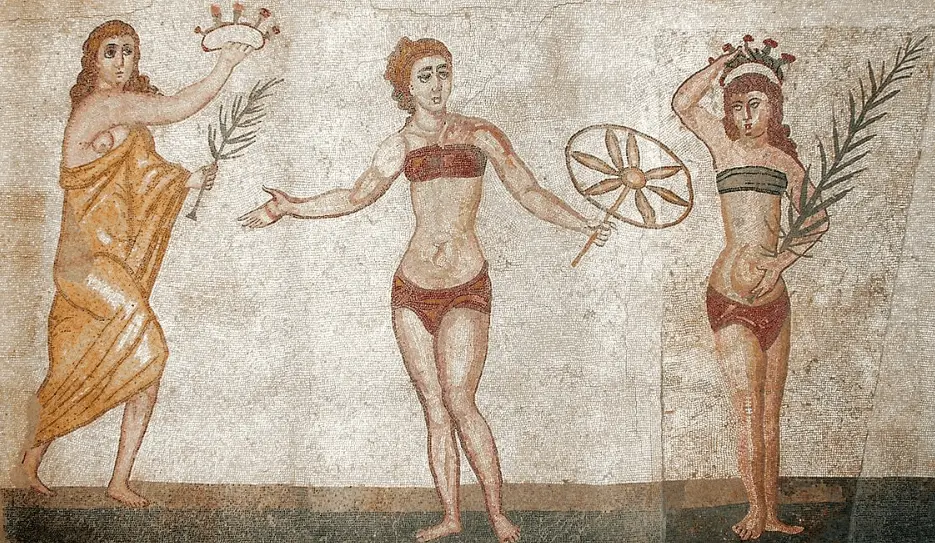
9. Where does the word “Fascism” come from?
Here’s another fun fact about the Romans you probably didn’t know yet.
A symbol of the unity of Rome along with the power and authority of the one holding it was the “Fasces.”
The fasces was a bundle of tied wooden rods with a red ribbon which often includes a bronze ax.
The Italian word “Fascism” is derived from it and refers to unity and power.
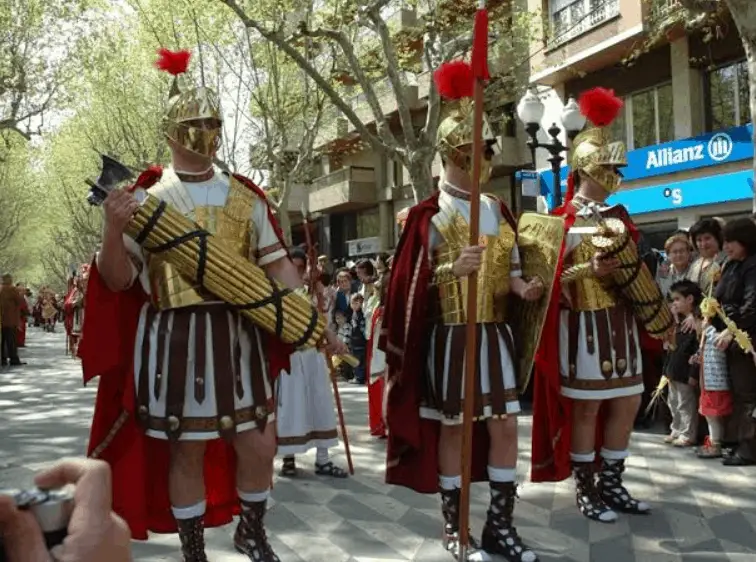
10. If you were a Roman general, you better won the battle
As in most battles in history, the Roman generals weren’t actually doing the fighting. They were safely positioned behind the Roman army that was doing its thing.
It wasn’t exactly safe though…
If you were a Roman general, you better made sure you had a good plan and your soldiers followed your orders.
If the battle got lost, there were two options for the Roman general:
- He could either kill himself
- He could join the army and fight to the death
Roman generals better did their homework don’t you think?
11. Romans ate pretty weird food
It wasn’t quite your favorite Italian restaurant in ancient Rome. A lot of the food they ate gives you a sudden urge to vomit.
That being said, they generally had about the same routine when it came to eating their food as most people know today. This means an early breakfast (called ientaculum, followed by a large dinner (called cena) and a light meal at night (called vesperna).
What they ate, however, quite differs from what we are used to.
Welcome to the cuisine of ancient Rome.
Garum
Let’s start with the favorite sauce of Romans, something they put on just about everything they ate. It was prepared from fish intestines and blood which were marinated and put into the hot sun for several weeks to ferment. After this process, some herbs were added and Garum was ready to be served alongside the main dish.
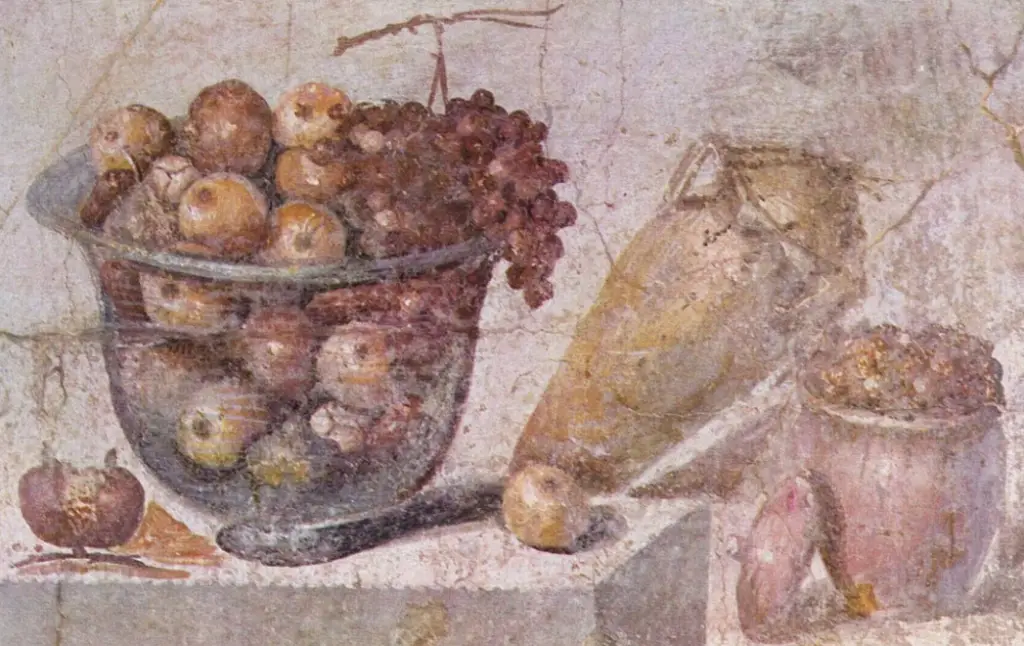
Giraffe meat
Even though Giraffes were considered peaceful animals in ancient Rome, they were still used during gladiator fights. To make things worse, a bone has been found in one of ancient Rome’s restaurants which proves these poor long-legged animals were on the main dish list as well.

Jellyfish
Rather uncommon and most probably only reserved for the wealthy people of Rome, the Apicius (the best-preserved Roman cooking book) mentions the consumption of jellyfish. More specifically, it mentions how to prepare a jellyfish omelet.

Sea urchins
Probably not that weird is the inclusion of sea urchins in ancient Roman cuisine. After all, we also eat crabs, shrimp, oysters, and other weird-looking seafood. That being said, sea urchins aren’t quite on the menu anymore but were one of the most popular dishes in ancient Rome for both the wealthy and regular citizens of Rome.
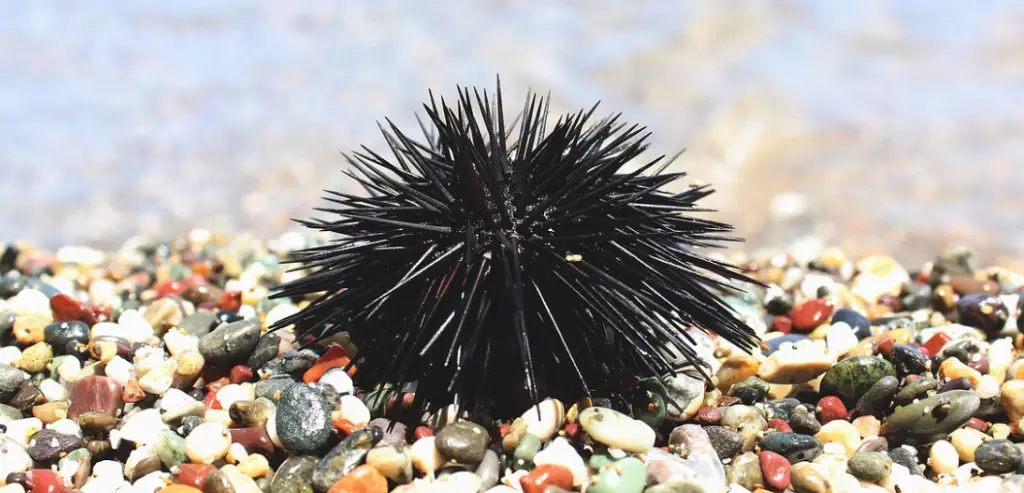
Dormice
Eating rodents isn’t something we do. We consider rodents to be disgusting little animals that carry a plethora of diseases. In ancient Rome, it was considered a delicacy and status symbol and was served on the richest banquets. One politician in his right mind called Marcus Aemilius Scaurus put a ban on eating dormice. His attempt to make the practice disappear was unsuccessful.

Tongue of flamingo
Flamingos were another one of those weird status symbols in ancient Rome. If you owned a lot of those birds, people knew you were rich. If you sacrificed one of those birds in order to eat its tongue, your prestige only increased. That and the fact that Romans loved to eat the tongue of a flamingo (especially flavored with some garum) made the dish very popular amongst the upper class of Rome.

12. Romans ate lying down
If we have our meals, we usually sit at a table on a chair. Not in ancient Rome!
If you were invited to Roman’s house for dinner, you would find a row of couches in the living room, a big table with food in the middle, and people lying around it.
Their left hand was used to rest their head on and the right to pick up the food and eat it.
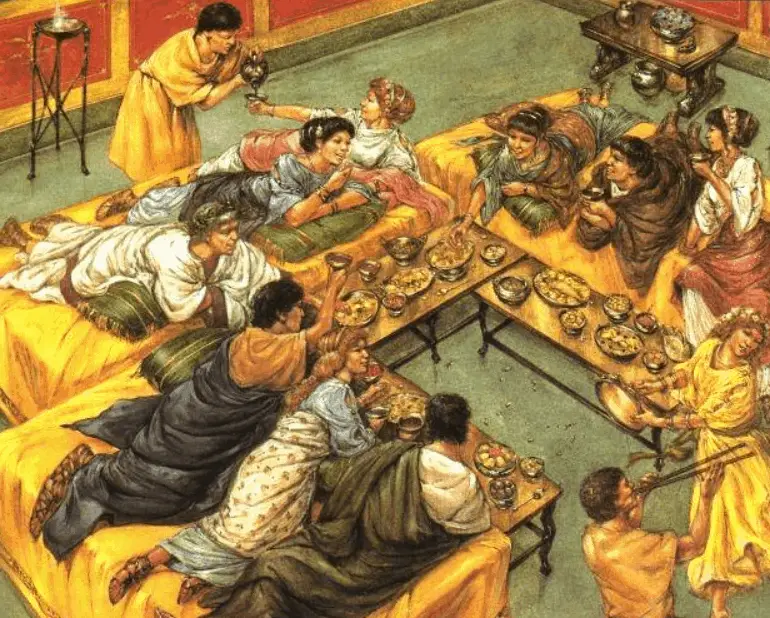
13. The Hannibal legend
When we try to make our children scared these days, we often refer to the bogeyman. He’s going to get you if you don’t behave.
In ancient Rome, they kinda had their own bogeyman.
A slight detail that made a lot of difference: He was actually real!
Hannibal Barca was a Carthaginian general and statesman who is considered to be one of the greatest generals in history.
He crossed the Pyrenees and Alps in order to invade Rome, and it took one of the greatest armies of all times, the Roman Army, 17 years to actually defeat him.
He scared Romans so much that parents referred to him the same way as we refer to the bogeyman today.
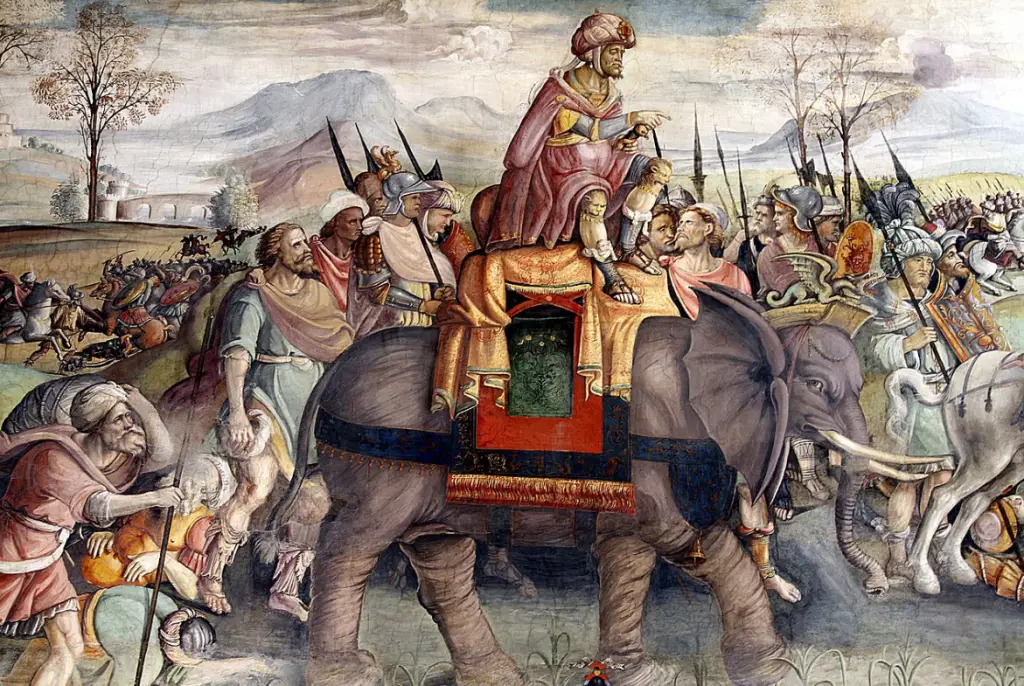
14. Romans feared the left
Another weird superstition during ancient Roman times was fearing everything that has to do with the left.
Better yet, Romans were superstitious in general!
To give some examples:
- Owls were considered a bad omen
- The scent of cyclamen flowers would prevent baldness
- Ringing bells would ease the pain of childbirth
- Seeing bees was a sign of good luck
The fear of the left is reflected through the word they used for left, which was “Sinister.” Left-handed was referred to as “Sinistra.”
In fact, the word sinister also meant “evil” or “unlucky,” further explaining why they had such a bad feeling about the left.
And yes, that’s where the word we still use, sinister, comes from.
15. Being late was not a big deal
The ancient Romans didn’t have a watch as we use it today and used to rely on the sun on to determine what time it was.
The problem with that is that every day, the time it actually took for an hour to pass was different.
In summer, the hours would be much longer than in winter. An hour during summer could last 75 minutes while an hour in the winter could last for just 44 minutes.
This resulted in the fact that Romans didn’t really care if you were late, and they weren’t very punctual in general.
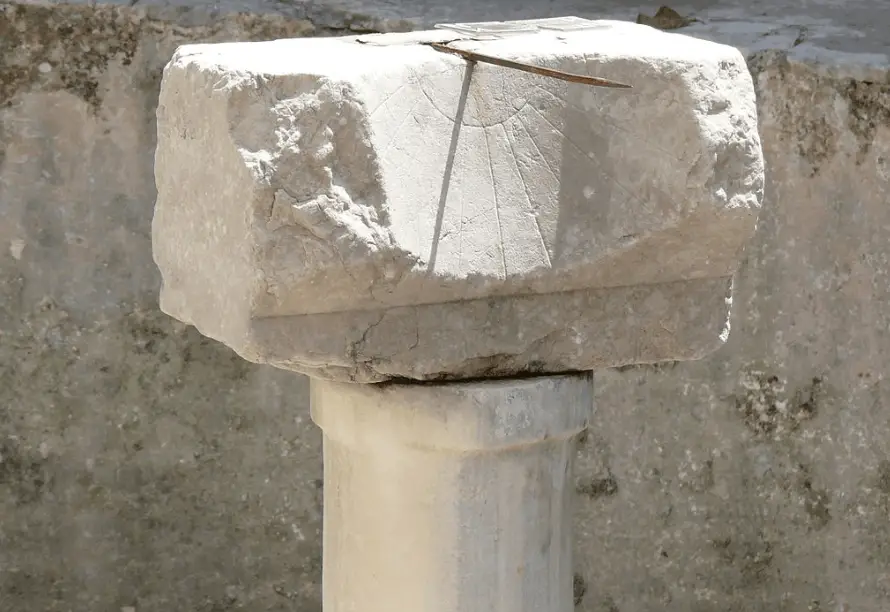
16. Vomiting during banquets
Ever saw the scene in the second “Hunger Games” movie in which the exuberant party in the Capitol included drinking a certain substance to induce vomiting?
Here it is:
That’s actually a practice that really happened in ancient Rome!
If there was a party, Romans would stuff themselves until the point they were completely knocked out.
To resume the party, they simply vomited everything they ate so far, quickly felt much better, and repeated their indulgence again.
One could say this behavior is the epitome of hedonism.
17. The sewer had a Goddess
The Cloaca Maxima, Rome’s famous sewer, was one of the marvels of the ancient Roman civilization.
Not for numerous centuries would a similar system appear, meaning it was well ahead of their time.
The Romans also had numerous Gods. In fact, they had a God for just about everything!
That included Cloacina, the Goddess protecting Rome’s famous sewer.
Lord Byron, one of the friends of Mary Shelley, the author of Frankenstein (and the one indirectly responsible Frankenstein was ever written in the first place), wrote a fitting poem in its honor:
O Cloacina, Goddess of this place,
Look on thy suppliants with a smiling face.
Soft, yet cohesive let their offerings flow,
Not rashly swift nor insolently slow.
Apart from protecting the sewer, Goddess Venus Cloacina had the responsibility of protecting sexual intercourse in marriage.
Two jobs in one! 🙂
